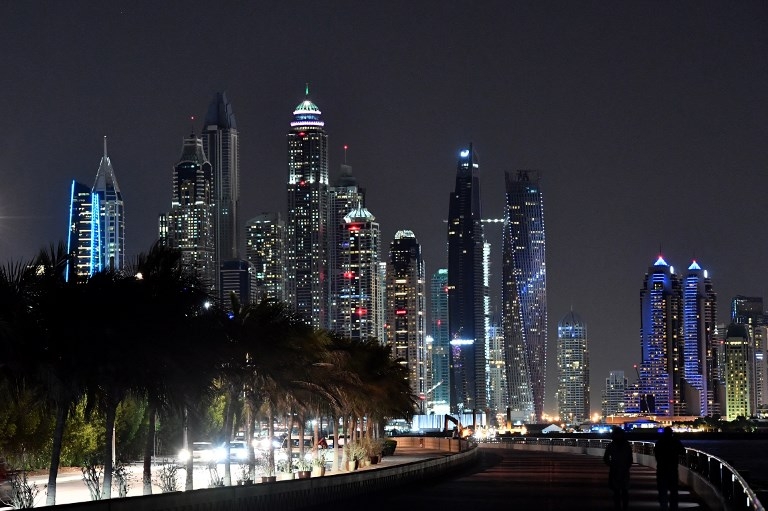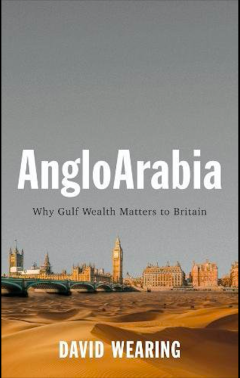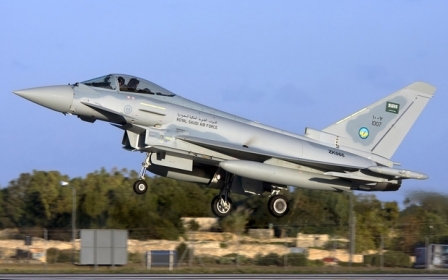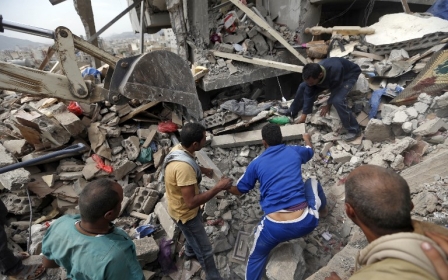Follow the petrodollars: Why Gulf wealth matters to Britain is a question everyone should be asking

In November 2012, former British Prime Minister David Cameron descended upon the Gulf for a visit aimed at - among other things - selling a bunch of Typhoon fighter jets to Saudi Arabia and the United Arab Emirates.
After all, what else could the UK head of government possibly have to do besides play travelling arms salesman?
In response to concerns about the dismal human rights records of the territories in question, Cameron offered the following reassurance: “[W]e do believe that countries have a right to self-defence, and we do believe that Britain has important defence industries that employ over 300,000 people, so that sort of business is completely legitimate and right.”
Increasing arms supplies
This sort of logical leap would become even trickier a couple of years later, when the UK supported the slaughter-fest in Yemen presided over by a Saudi- and Emirati-led coalition. As for the whole business of defence, this, it turns out, is one significant aspect of an extensive and complex UK-Gulf relationship that must be defended at all costs.
In a newly released book entitled AngloArabia: Why Gulf Wealth Matters to Britain, David Wearing - a teaching fellow in international relations at Royal Holloway, University of London - sets out to methodically document the nature and function of these ties.
Wearing contends that the 'moral questions' arising from British military collaboration and arms sales to Gulf monarchies have 'become the relationship’s major point of political vulnerability'. But when, out of curiosity, has the British state ever exhibited a surplus of morals?
“The strategic value of the Gulf Arab monarchies to British capitalism and the British state,” Wearing writes, “has meant that securing and defending those monarchies from the threat posed by their own populations has long been a priority for London.”
So much for “legitimacy” and “self-defence”.
Case in point: the Arab uprisings of 2010-11, which included a panorama of brutal repression in Bahrain - that lovable kingdom and devoted ally described by Britain’s Royal United Services Institute as a "substitute for an aircraft carrier permanently stationed in the Gulf".
Overall, reports Wearing, “the data show that the British government’s response to the new wave of demands for democracy region-wide was to continue a sharp increase in arms supplies to its key authoritarian allies”.
Massacre in Yemen
Nor do the figures lie in Yemen, where anti-highlights of the ongoing US- and UK-backed assault have included the massacre of children on a school bus and the unfolding of the world’s worst humanitarian crisis, according to the United Nations.
Wearing notes Campaign Against Arms Trade statistics showing that the UK “approved military export licenses for Saudi Arabia with a total value of £4.6 billion [$6.1bn]” between 2015, the start of the coalition’s “intervention”, and 2017, with £2.8bn in the first six months alone. By contrast, the whole of the preceding year had seen only £102m ($135m) approved.Furthermore, when in July 2015 Saudi stockpiles of 500-pound laser-guided bombs manufactured by Raytheon UK began to dwindle, “the British government authorised Raytheon to rearrange its production schedule to prioritise replenishment of [Saudi] stocks ahead of an order for the British Royal Air Force”.
Wearing contends that the “moral questions” arising from British military collaboration and arms sales to Gulf monarchies have “become the relationship’s major point of political vulnerability”. But when, out of curiosity, has the British state ever exhibited a surplus of morals?
Surely not during that obscene experiment in total devastation known as the US-led war on Iraq, during which America’s hand was tightly held by Tony Blair - the former UK prime minister, eligible war criminal, and gifter of sweaters to George W Bush.
Without doubt, Britain’s impressively violent imperial history also raises all manner of “moral questions”. And as Wearing makes clear, it was during this very period of empire - comprising a century and a half of British dominance in the Gulf - that the foundations for contemporary interdependence were established.
The role of Gulf petrodollars
Throughout AngloArabia, Wearing ably demonstrates that it’s impossible to analyse the UK-Gulf relationship against anything but a backdrop of capitalism - as is the unfortunate truth for analysing pretty much everything these days.
While British arms exports to the Gulf “help the UK to maintain the military-industrial capacity required as the basis for global power projection” in the neo-imperial era, Gulf petrodollars recycled through trade and investment deals also “play an important role in addressing the key macroeconomic challenges facing the British economy and in maintaining Britain’s status as a leading capitalist nation”.
Recall London’s position as a major global financial centre skilled at attracting petrodollars, and it becomes ever clearer why, indeed, Gulf wealth matters to Britain.
Add to the oily mix the fact that “two of the world’s leading multinationals whose commercial health is a key concern for the British government” happen to be the British and Anglo-Dutch oil companies BP and Shell.
Though Britain has of course long been surpassed by the US in terms of superpowerdom, it maintains an “active commitment to the continuation of US hegemony … with its own state and capitalist interests seen as best pursued within that overall framework”. Given that dominance of the Gulf is crucial to the maintenance of hegemony, Wearing argues, British dealings in the region “should be understood as complementing and reinforcing US efforts to entrench a conservative regional order oriented towards Western power”.
Naturally, Western powers can’t come right out and admit that they’re backing repressive authoritarianism in the Gulf despite their incessant bleating about freedom and democracy. So, for example, the British government “tends to claim that the monarchies themselves are agents of moderation and sustainable reform, and that continued friendly engagement is the key to encouraging them further down this path”.
The Friedman doctrine
Such claims would no doubt be music to the ears of another servant of US empire: decorated New York Times foreign affairs columnist Thomas Friedman, who has been known to trip over himself in praise of the “decency and moderation” of former Saudi Crown Prince Abdullah and the veritable revolution allegedly sweeping Saudi Arabia thanks to the kingdom’s current tyrant, Mohammad bin Salman.
Additional Friedmanian adulation has been directed at the “progressive king” of Bahrain, as well as that nation’s “innovative crown prince”, with whom Friedman once even ate pizza at a Bahraini bistro. As part of this mind-blowing experience, our columnist was able to observe a veiled woman at an adjacent table with a daughter who was “dressed like an American teenager and had what looked like a tattoo on her left shoulder”.
In an age in which militant capitalism is screwing over the entire planet, questions like why Gulf wealth matters to Britain aren’t asked nearly enough
As they say, nothing spells liberty and human rights like a maybe-tattoo.
Especially in light of the rubbish that passes for analysis in the Western establishment, then, Wearing should be heartily applauded for his thorough work. And while AngloArabia may at times come off as slightly repetitive - with certain sections characterised by overly diplomatic language - there is also much to be said for calmly and composedly driving one’s points home, line after line.
In an age in which militant capitalism is screwing over the entire planet, questions like why Gulf wealth matters to Britain aren’t asked nearly enough.
- Belen Fernandez is the author of The Imperial Messenger: Thomas Friedman at Work, published by Verso. She is a contributing editor at Jacobin magazine.
The views expressed in this article belong to the author and do not necessarily reflect the editorial policy of Middle East Eye.
Photo: A picture taken on 11 January 2018 shows the skyline of the Dubai Marina (AFP)
New MEE newsletter: Jerusalem Dispatch
Sign up to get the latest insights and analysis on Israel-Palestine, alongside Turkey Unpacked and other MEE newsletters
Middle East Eye delivers independent and unrivalled coverage and analysis of the Middle East, North Africa and beyond. To learn more about republishing this content and the associated fees, please fill out this form. More about MEE can be found here.






